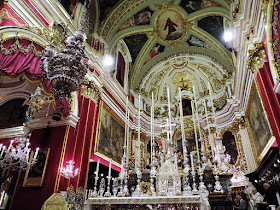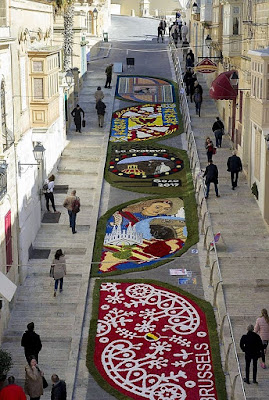 |
| 'Triptych of the Holy Rosary' by Hans Suess Von Kulmbach |
One
of the paintings that struck me the very first moment I saw it is the 'Triptych
of the Holy Rosary' by Hans Suess Von Kulmbach (1510,) which is in the Thyssen
Bornemisza Museum, Madrid. The two side panels show the Presentation of Mary,
with St. Joachim and St. Anne at the bottom of the steps, while the other one
show Mary’s parents in a loving embrace. The center and more prominent panel is
very descriptive, and shows the Crucifixion encircled within the Rosary beads,
each Hail Mary symbolized by a rose flower. The 5 Our Fathers are symbolized by
5 crosses, also symbolic of the 5 wounds of Christ. A scene from hell is shown
in the bottom, with two angels above and two others below, one of whom I seen
saving a baby and the other holding scales in his hands.
The
4 layers of saints are described as follows, from top, left to right:
1. With God the Father and the Holy Spirit are
seen Mary and a variety of angels.
2. Melchizedek, David, Moses, John the Baptist - Peter, Mark, Paul and Luke.
3. Lawrence, George, Erasmus, Stephen, Holy Innocent baby - Gregory, Jerome, Nicholas, Charlemagne.
4. Clare, Agnes, Barbara, Catherine of Alexandria - Anne, Mary, Mary Magdalene, Helen.
There will not be any posts over the next few days. Stay tuned.
2. Melchizedek, David, Moses, John the Baptist - Peter, Mark, Paul and Luke.
3. Lawrence, George, Erasmus, Stephen, Holy Innocent baby - Gregory, Jerome, Nicholas, Charlemagne.
4. Clare, Agnes, Barbara, Catherine of Alexandria - Anne, Mary, Mary Magdalene, Helen.
There will not be any posts over the next few days. Stay tuned.









































